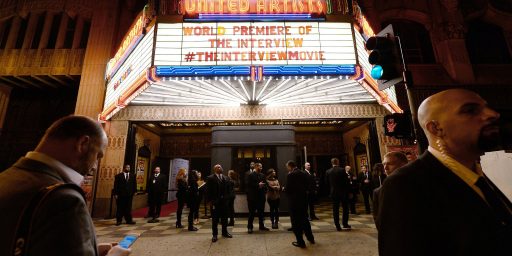Fight Over HD DVD Format
New DVD Format Being Marketed (TechNewsWorld)
Toshiba and Japan’s Memory-Tech disk maker say they have developed a disk that combines a standard DVD with a new high-definition format. Known as HD-DVDs, the new format will be able to hold about three times as much data as DVDs now available, giving enough room for hours of high-definition video, the Wall Street Journal reported Tuesday. They will be read with a blue laser, while regular DVDs use a red laser. One layer of the new disk is in standard DVD format, which holds 4.6 gigabytes of data, while the other layer will be in the 15 Gb HD DVD format.
Such a combination of formats lets film studios put a movie in DVD format on one side and, on the other side, in HD DVD format. It also eases the transition to the new format since consumers who don’t have new HD DVD players could still use the new combination disks on their old DVD players.
This is excellent news for consumers. Kudos to the industry for doing this. In the past, they would have put out a non-compatible format in hopes of getting people to rebuild their media libraries in the new, improved format.
Update (1100): As Alex Knapp notes in the comments, there is some division over whether HD-DVD is the best available format. Slate’s Paul Boutin thinks not:
HD-DVD Must Die: Sony’s Blu-ray is the better next-generation DVD
Universal, Paramount, New Line Cinema, and Warner Bros. just announced that, starting next year, they’ll ship high-definition movies on new high-capacity disks called HD-DVDs. The catch: You’ll need to buy a new player to watch them. (Some disks, like the prototypes announced today, may also play on your current player, but in low-resolution mode.) Moreover, lots of computer makers and two other big studios, 20th Century Fox and Sony Pictures, have already pledged to adopt the Blu-ray format, which is expected to debut around the same time (and will also require a new player).
He links a comparison chart showing that the two formats are remarkably similar:
They key difference, Boutin argues, that has pushed HD DVD to the forefront is economy:
So, why do so many Hollywood studios want their HD-DVD? Probably because they’re a whole lot cheaper to manufacture. Earlier this year, some Taiwanese disk makers told PC World that prerecorded HD-DVDs will be cheaper to churn out than Blu-ray disks. Since HD-DVDs have the same size layers as today’s disks, existing DVD factories can start churning out HD-DVDs without much retooling. But Blu-ray disks, with their thicker data layers, won’t be so easy to make. New, expensive assembly lines will have to be built—that’s the kind of expense that cuts down profit margins.
It’s pretty obvious that HD-DVD isn’t being rolled out to benefit high-definition-deprived viewers. Consider that HD-DVD reps told the Times that, rather than increase capacity, they’re “considering more efficient software compression” to squeeze longer high-def movies onto their disks. Isn’t the whole point of these new disks that they’ll accommodate high-definition formats without stripping them of their high resolution?
Interesting. And beyond my technical expertise, I’m afraid. No worries on my end, though. I tend not to be an early adopter of such technology, usually waiting a few months for the prices to plummet and such issues to work themselves out.
Update (1127): It’s not over yet:
Disney backs Sony̢۪s Blu-ray DVD format (Financial Times)
The battle to set the standard for next-generation digital recording media took another twist on Thursday with the announcement that Walt Disney would launch titles on the Blu-ray Disc format promoted by Sony and Matsushita.
Disney’s move divides the allegiance of Hollywood studios – with Disney, Sony Pictures Entertainment, MGM and possibly 20th Century Fox supporting the Blu-ray format, while Paramount, Universal, Warner Brothers and New Line Cinemas have committed to a rival format, known as HD-DVD.
The split has reinforced concerns that consumers will be saddled with two competing formats battling for dominance. Disney, like most other Hollywood studios, said its format preference was non-exclusive, which raises the prospect of further lobbying by both camps.






Well, they SHOULD go with Sony’s Blue-Ray standard, which will play normal DVD’s AND can store more memory, leading to less glitches due to compression.
It really doesn’t matter.
Whatever they decided, they’ll be $29.99 at Best Buy the following Christmas.
The days of a 5 or 6 year adoption cycle for computer technology are over.
Blu-ray hasn’t a chance, but they’ll keep flogging it.
Blu-ray may be “better” technologically, but practical considerations doom it to a short lifespan; it will be the next Beta. Most of us just got done switching to DVDs, and asking people to buy a completely incompatible player is insane. Furthermore, it’s overkill; HD-DVD’s increased capacity is more than sufficient, especially when you consider that many current DVDs only use 50-60% of the available capacity.
The other consideration is that none of these technologies will be around longer than 10 years. Why? Because sooner than that the moral equivalent of downloading movies over the ‘net will be commonplace–buy a movie, download it in 10 minutes, and watch. Much cheaper and easier for everyone involved.
(‘course I’ve been predicting that for CDs for years, and it’s been taking a looong time… due largely to resistance on the part of the record industry. iTunes is a start, though.)